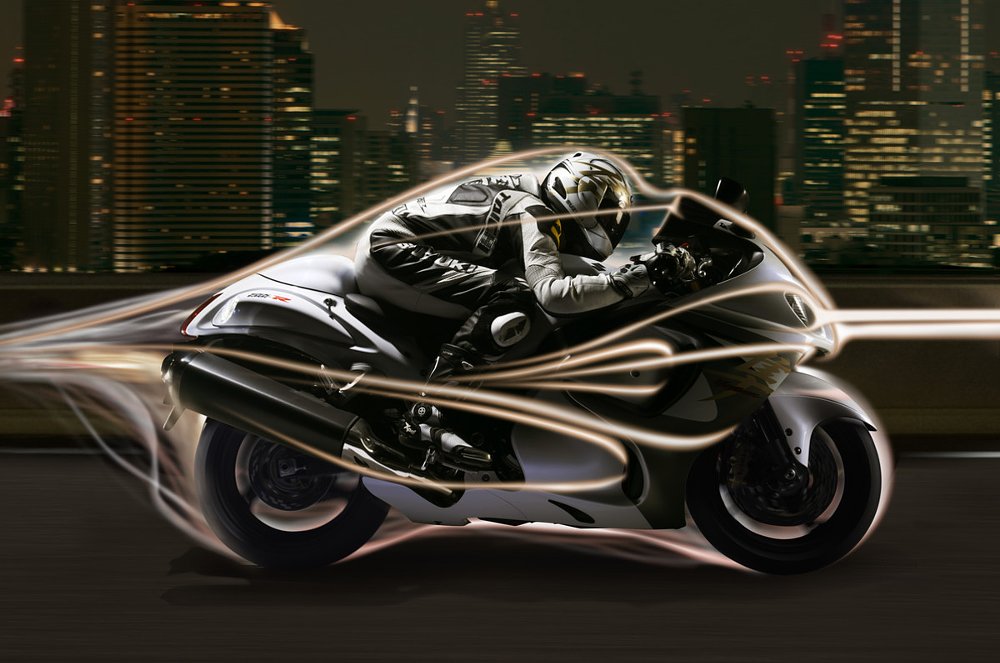What were you doing in 1999?
Suzuki was pulling the wraps off their radical new GSX1300R Hayabusa, a streamlined hypersport and instant icon. The first and only major update came almost a decade later for the second-gen model. Now, more than two decades since the model's debut, Suzuki brings us "the quickest, most technologically advanced and aerodynamic Hayabusa yet."
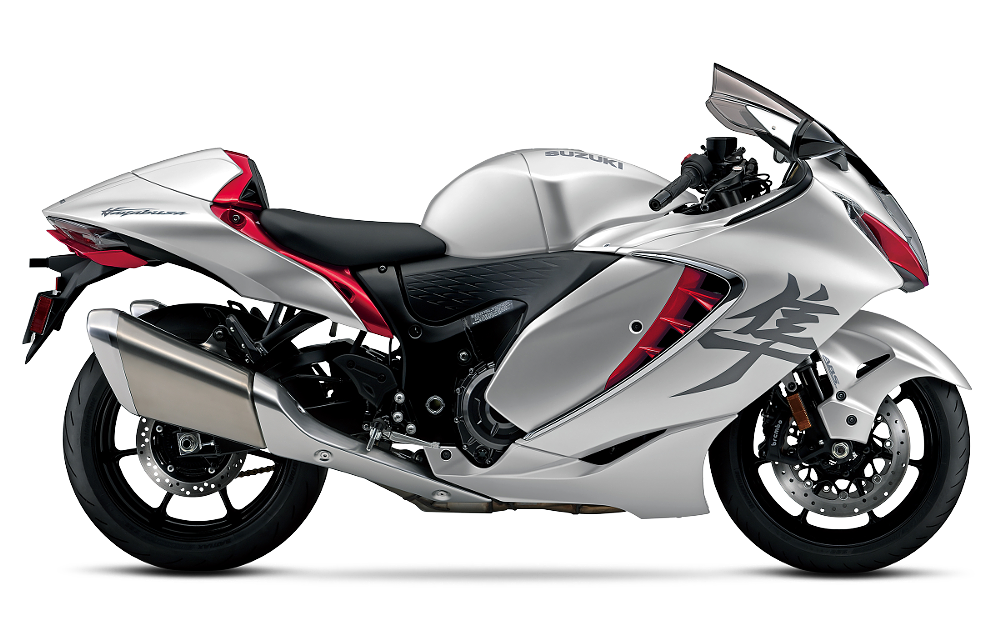
Suzuki continues to call the Hayabusa “motorcycling’s Ultimate Sportbike,” and with a range of updates to the styling, engine, chassis, and technology, this is the freshest GSX1300R they’ve produced since 2008 with “550 new or redesigned parts, all with a focus on delivering the ultimate and balanced sportbike experience” on board. Does the bike live up to Suzuki’s claims? Let’s find out.
Styling
Straighter, sharper design is a bit of a departure from the Hayabusa’s past. The bike’s nose and tail are much more in line with the GSX-R line for the next generation. It’s a little more modern and a little less polarizing, which should help Suzuki on the sales floor.
Now, that doesn’t mean Suzuki’s given up on their aerodynamic optimization that spawned the ‘Busa’s unique bodywork in the first place. The Hayabusa still claims one of the best drag coefficients of any street-legal motorcycle available, and it’s also superior to the previous two gens. (I think Gen 1’s bodywork was mostly function over form, whereas Gen 2 came across as more fanciful.) Note the low, slim mirrors. Lighting is now fully LED with the usual Suzuki stacked-light treatment at the front.
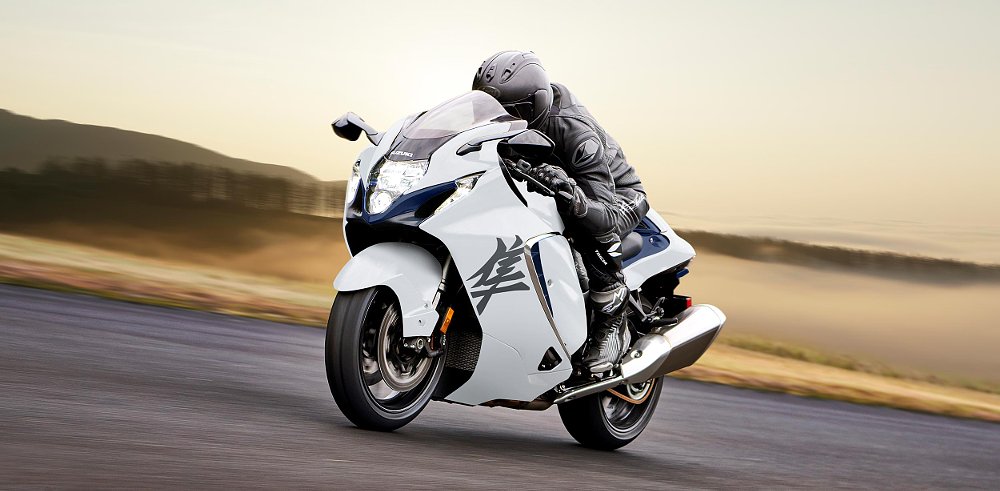
The new muffler is so large that I assumed they’d gone to a four-into-one design when I first saw Suzuki’s photos. Nope, there’s another megamuffler on the other side, staying true to the Hayabusa’s traditional layout. The new pipes are 4.5 pounds lighter than the old ones, to their credit.
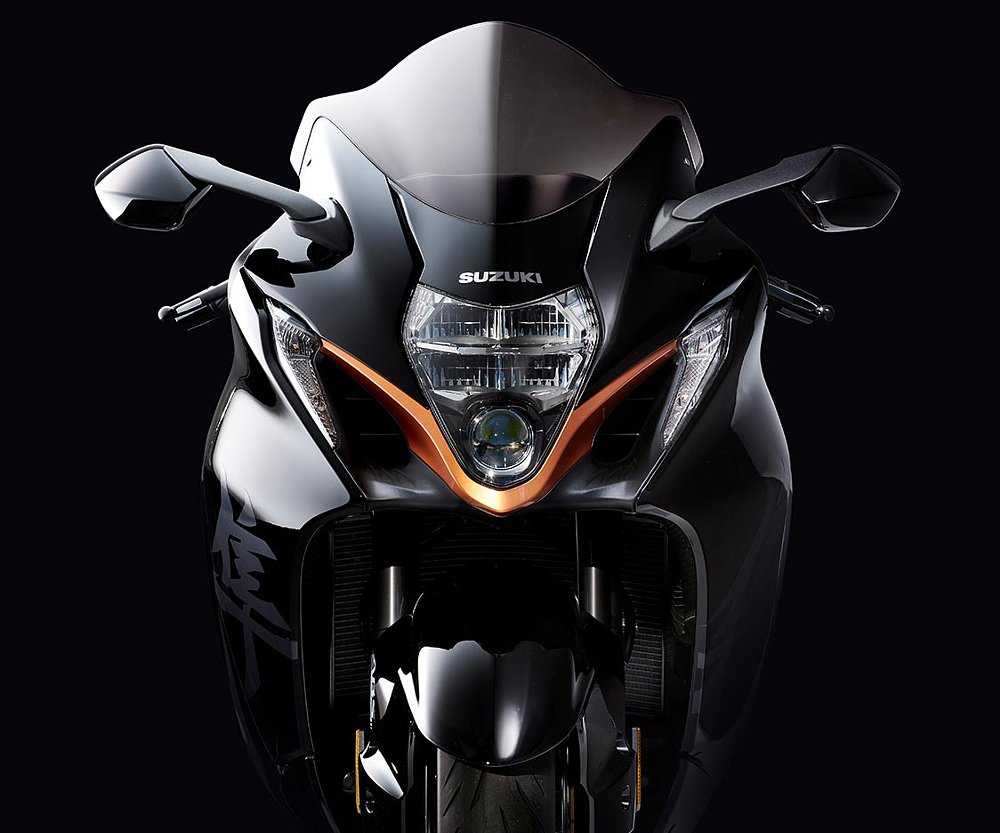
Engine, chassis and performance
The third-gen Hayabusa’s engine is a heavily revised version of the previous iterations, with updates to improve emissions, power, and longevity. I’d expected to see a displacement bump of some kind, but apparently Suzuki was able to meet their goals without boring or stroking the mill. Instead, there’s a new crankshaft, lighter con rods, revised pistons, and improved timing. The crank receives 54 percent more oil flow with some tricks from the GSX-R1000. Suzuki claims this is the quickest Hayabusa with its newfound torque. It’s all fed by new ride-by-wire fuel injection, which sets the stage for many of the tech updates we’ll cover in a minute. Other improvements include a lighter clutch pull, a redesigned shifting mechanism, and an uprated cooling system.
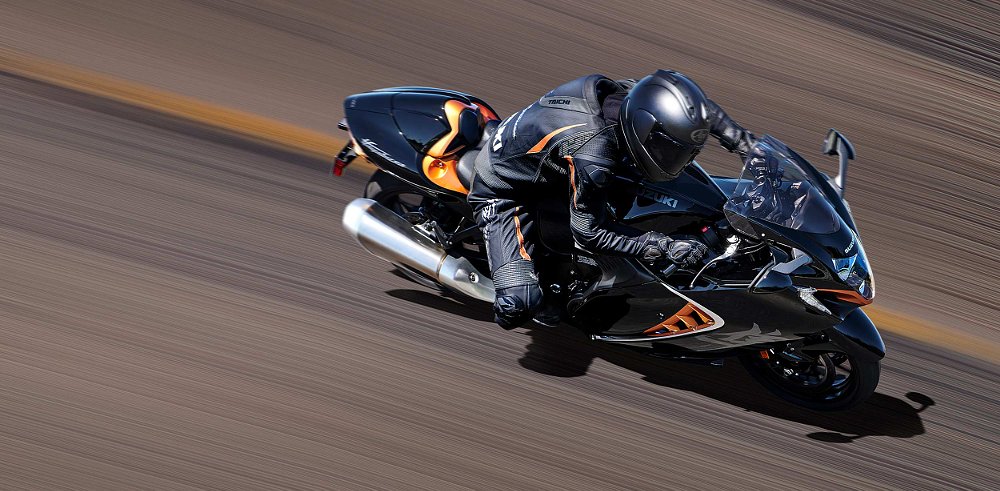
In the braking, chassis, and suspension department, Suzuki’s given their flagship motorcycle some modern parts, starting with new Brembo Stylema brake calipers, gripping 320 mm rotors on all-new wheels wrapped in Bridgestone Battlax Hypersport S22s. The KYB fork and shock are also revised. It’s all carried in Suzuki’s usual twin-spar aluminum frame, which has also been modified slightly from the original with a lighter subframe. Seat height’s down to just 31.5 inches.
Tech
The revised engine and updated styling aren’t the driving forces of innovation for the new model. Instead, Suzuki bestowed the Hayabusa with loads of new tech to bring the bike up to current standards, and they’ve made some smart moves here. It all starts with the Suzuki Suzuki Intelligent Ride System (SIRS, not to be confused with the SRIS seen on their old two-strokes). There’s (deep breath) a six-direction Bosch IMU, selectable power modes, launch control, anti-lift control (10 levels), engine brake control, traction control, cruise control, combined braking, hill hold, and a bi-directional quickshifter.
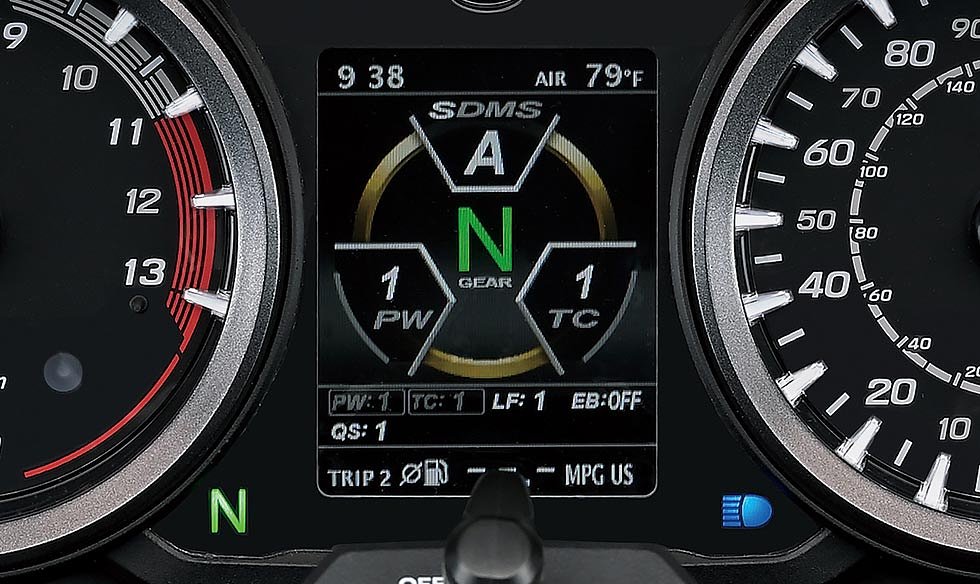
One of my favorite parts of the SIRS suite is the Active Speed Limiter. “This highly practical system allows the rider to set a speed limit the bike will not exceed, eliminating concerns about speeding or driving faster than intended,” says Suzuki. This feels like a nod to the Hayabusa’s role in the speed wars, and the resulting soft limits on production bike top speeds afterwards. Why not just “limit” your top speed with throttle discipline like every other motorcycle, you ask? Because this is a Hayabusa, man... I think the Active Speed Limiter is my favorite bit of new tech here.
These features are monitored from the new full-color TFT dash they’ve wedged between analog dials. Those twin clocks have been part of the Hayabusa since the beginning, and I’m glad to see that Suzuki kept them around. All those features and modes are made possible with the ‘Busa’s new CAN-style wiring and dual-core 32-bit ECM. The charging system is a hefty 400W arrangement.
Who’s the target customer?
The new Hayabusa is meant to feel familiar, although its infusion of tech and style push it in new directions. The bike now looks more conventional, for starters, and it packs many of the features that riders expect from premium motorcycles today.
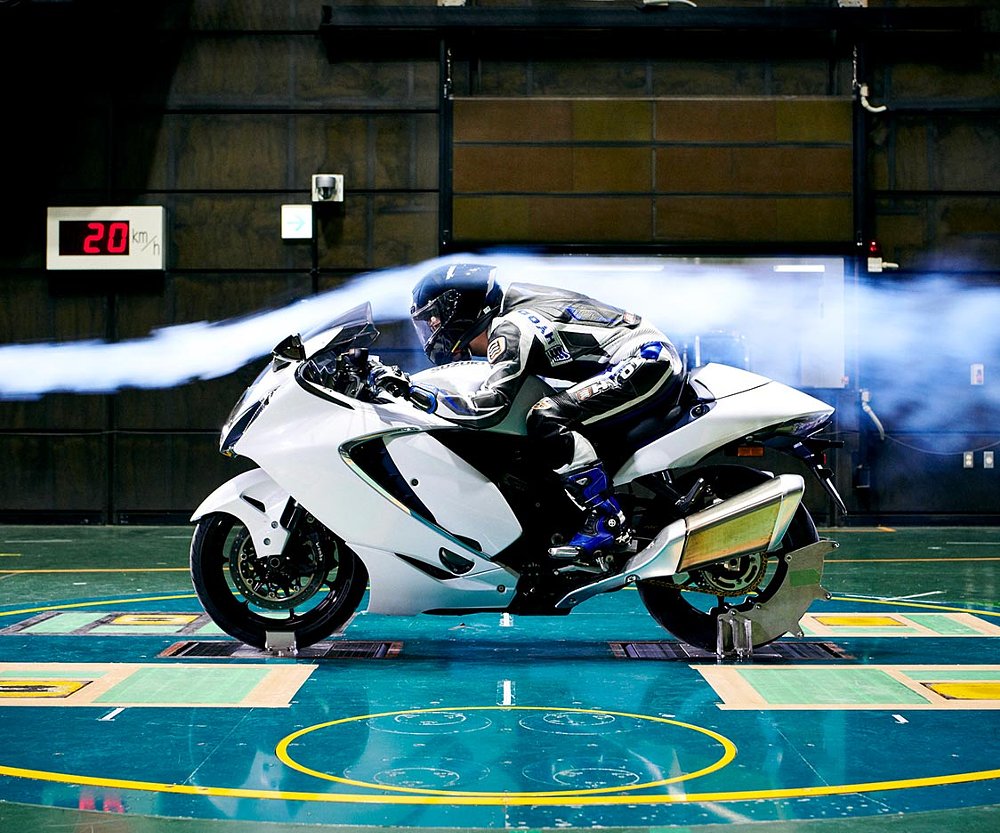
I’m sure the traditional Hayabusa fan who simply loves powerful motorcycles that make a statement will be a bread-and-butter customer. Radical changes to the Hayabusa might've pushed these riders away. Besides, why build the ‘Busa into something it ain’t?
If anything, the bike’s new tech broadens its appeal. The Active Speed Limiter tells me they still expect to sell Hayabusas to people who probably shouldn’t be riding Hayabusas. Quickshifting, power modes, launch control, the IMU, and nice brakes tell me they want to intrigue proficient riders, too. And cruise control opens the door for the sport-touring crowd, which will probably want to add the optional touring screen, tank bag, and CAN-ready heated grips.
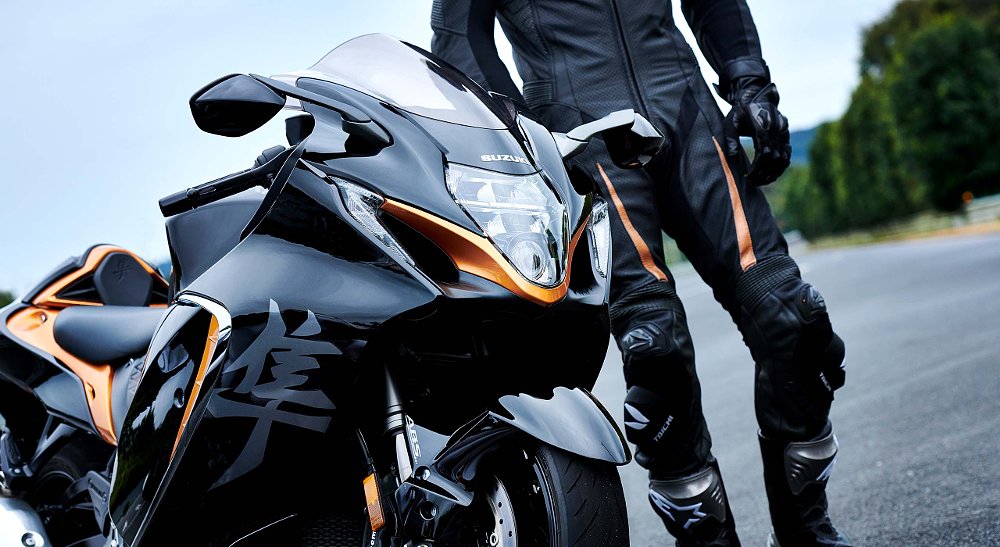
The Hayabusa is still a larger-than-life brute that can break any U.S. road’s speed limit in first gear. It hasn’t been declawed or restricted, even though the turbo rumors never came true, and the 'Busa actually dropped a few horsepower. Instead, the bike gains broader appeal with its fancy tech, but all those features come at a price. Pricing starts at $18,599, or $3,800 more than the Gen Two. That puts the Hayabusa up against some compelling competitors. Time will tell how it stacks up.
The 2022 Hayabusa will be available (date not yet announced) in Glass Sparkle Black/Candy Burnt Gold, Metallic Matte Sword Silver/Candy Daring Red, Pearl Brilliant White/Metallic Matte Stellar Blue.
|
2022 Suzuki Hayabusa
|
|
|---|---|
|
Price (MSRP)
|
$18,599
|
|
Engine
|
1,340 cc, liquid-cooled, DOHC inline-four
|
|
Transmission,
final drive
|
Six-speed, chain
|
|
Claimed horsepower
|
187 horsepower @ 9,700 rpm |
|
Claimed torque
|
110 foot-pounds @ 7,000 rpm
|
|
Frame
|
Aluminum twin-spar
|
|
Front suspension
|
KYB USD 43 mm fork, adjustable for preload, rebound, and compression
|
|
Rear suspension
|
KYB monoshock, TK adjustable for preload, rebound, and compression
|
|
Front brake
|
Dual Brembo Stylema calipers, 320 mm discs, ABS
|
|
Rear brake
|
Single rear caliper, 260 mm disc, ABS
|
|
Wheelbase
|
58.3 inches
|
|
Seat height
|
31.5 inches
|
|
Fuel capacity
|
5.3 gallons
|
|
Tires
|
Bridgestone Battlax Hypersport S22, 120/70ZR17 front, 190/50ZR17 rear
|
|
Claimed weight
|
582 pounds
|
|
Warranty
|
12 months
|
|
More info
|
|











